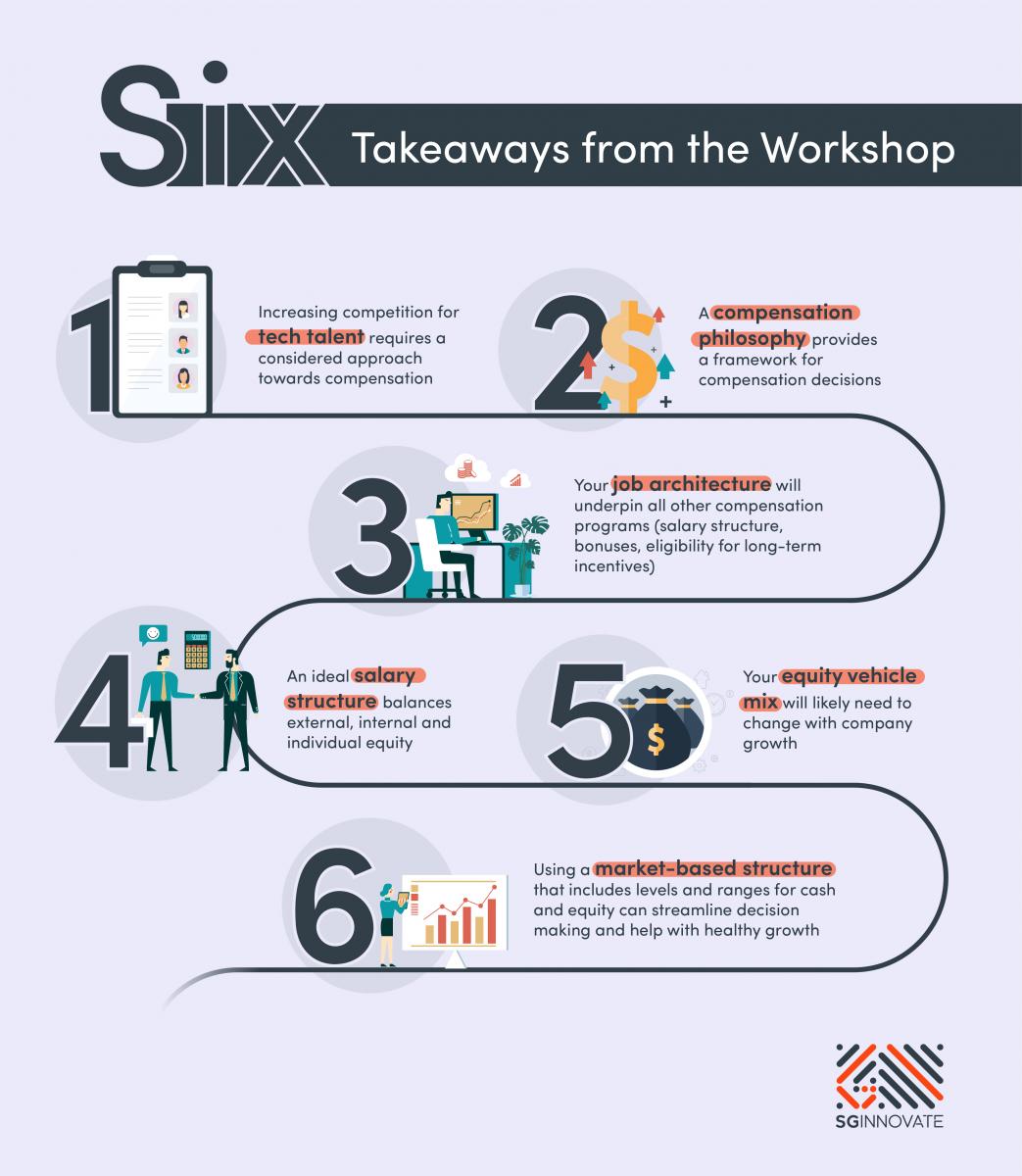Recruiting Top Talent on a Budget
Wed, 11/20/2019 - 12:00
At one of our recent workshops, early stage startup founders learnt how to recruit top talent while managing cash flow and scaling their companies.
If you’ve ever caught HBO’s comedy series Silicon Valley, you would have laughed and cried watching the protagonist bootstrap his tech startup Pied Piper out of a makeshift home office. While his antics may make for good TV, real-life early stage startups suffer from similarly painful budgetary constraints. Often enough, startup founders find it hard to hire top talent because of their inability to provide adequate cash compensation and formal annual incentives.
This tight financial situation is in sharp contrast with late stage startups and public companies, which can offer better compensation and incentives, in addition to formalised career paths within their organisations. Therefore, as early stage startups scale, their compensation packages need to also evolve, to reflect and support changing business and talent needs.
Topics surrounding compensation and benefits as companies scale were discussed at a workshop presented by SGInnovate, Aon and AWS, called “Building a scalable compensation programme”. It featured two experts in compensation consulting, Mr Ravi Nippani, Director at Radford and Private Market Practice Leader–APAC and MEA, Human Capital Solutions at Aon; and Mr Kyle Holm, Partner at Radford and Global Private Market Practice Leader, Human Capital Solutions at Aon.
The War for Talent has Intensified
The typical attendee profile at the workshop was a founder or co-founder of an incorporated startup company, seed stage and beyond. A key question that they hoped to answer was: “As a startup founder, how do I recruit top talent while managing my effective cash flow?”
During the course, both trainers shared key trends in the private market and tips on how to scale for growth. Founders were introduced to three key elements of hiring talent: building a scalable compensation programme, developing a compensation philosophy, and establishing their competitive marketplace. They were taught effective shareholder and board strategies for early stage companies, and how to build their first cash and equity compensation structures.
“Aon’s private market study shows four key trends that vary from the past: first, an increasing number of early stage and mid stage private companies are looking to implement equity refresh programmes,” Mr Holm shared, referring to a change in philosophy from the past, where employees were provided with equity only when they were hired. As the war for talent intensifies in the tech ecosystem, refresh programmes would help employers to retain talent, he said.
“Second, the market will see more early stage companies establishing cash-based structures that are aligned to competitive market practices,” Mr Holm said. “Third, there has been an emergence of performance-based bonuses in compensation programmes. Lastly, there has been a concerted effort by venture capitalists to invest in talent partner roles within their organisations.”
Equity, When Cash Flow is Tight
Although not always the case, the main factors that motivate individuals to join early stage startups include a ‘lottery ticket’ mentality –the potential to win big if the startup is successful– and the chance to be a part of an innovative young team, Mr Nippani said. The downsides that startup employees must contend with, however, include a lack of certainty in addition to less effective performance management systems.
If a startup is in bootstrap mode and cannot offer a large cash compensation package, how then can it reward its employees? “Equity!” said Mr Nippani. “Startups could solve most compensation problems with a strong, well-communicated equity compensation programme that shares in the value creation and creates a true ownership culture.”
Both experts agreed that a key mistake startup founders make is not putting in place adequate systems for talent retention early on. “Our private market consulting experience has revealed time and again that organisations wait too long to appoint a human resource leader. Companies that do get this right are usually at Series A,” said Mr Nippani. “Also, in Asia, most founders do not use the equity programme effectively to drive a performance-driven culture within their organisations.”
The half-day workshop was followed by a networking session, where the trainers heard founders’ stories and provided them tips on scaling their companies. “A big thank you to SGInnovate for organising a meaningful event that gave founders an opportunity to understand the competitive compensation practices. It was great interacting with SGInnovate’s talent team, who were well organised and resourceful,” Mr Holm said.

At SGInnovate, we build and develop Deep Tech talent capabilities through various learning opportunities. Be part of our network today.
Trending Posts
- How leaders should rethink cybersecurity strategy
- How to Future-Proof a Career in Deep Tech? Start here.
- Keeping satellites safe: How CYSAT Asia 2026 is tackling space cybersecurity
- The future of fusion energy: What will it take to bring the power of the stars to earth?
- How an aerospace engineer charted a path to quantum technology






